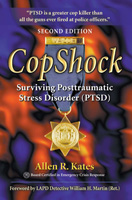
CopShock: Second Edition
Surviving Posttraumatic Stress Disorder (PTSD)
by Allen R. Kates, MFAW, BCECR
Peer Support for Police Officers' Family
A number of departments now provide
treatment services and training to officers’ families. Support helps to reduce
stress in the family, limit stress family members may cause the officer and turn
family input into a source of comfort. The International Association of Chiefs
of Police suggests that police agencies should offer support through marital
counseling, post-shooting trauma debriefing, group discussions, orientation
programs and frequent family events.
Some departments provide training for family
members while their loved ones attend the academy. The training may consist of
several weeks of ridealongs and courses on police work, stress management and
weapons practice. Martin Reiser, former director of the LAPD’s Behavioral
Science Unit, suggests that departments provide periodic stress training after
the academy in joint sessions for officers and family members. Further details
can be found on pages 137-147 of Developing a Law Enforcement Stress Program
for Officers and Their Families by Peter Finn and Julie Esselman Tomz,
1997. The entire 222-page book published by the National Institute of Justice is
online for free at: http://www.ncjrs.gov/pdffiles/163175.pdf
Police Family
Plan
As well as welcoming police officers, New York City’s
POPPA peer support organization invites police officer families to attend
seminars designed solely for them. The family is the most important support unit
for cops, and director Bill Genêt wants to be sure family members understand
their roles.
Known as the Police Family Plan, the discussion
group teaches loved ones, including children, how to identify and work with
officers suppressing feelings from trauma. Bill’s Peer Support Officers advise
family members to encourage police officers to talk about their feelings and
experiences, to make talking, usually taboo, acceptable. Vocalizing feelings
helps reduce the risk of developing PTSD. See Retirement in chapter 16 for
information on POPPA’s Retiree Program.
Go to: www.POPPANewYork.org. Write:
POPPA, Inc, Bill Genêt, Director, 26 Broadway, Room 1640, New York, NY
10004-1898, Phone: 212-298-9111.